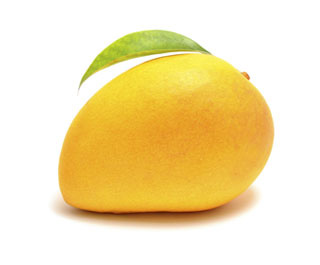Mango: "King of Fruits"
Botanical name: Mangifera Indica

As one of the most popular fruits in the world,1 mangos belong to the same family of plants as pistachios and cashews, which are also tropical, fruit-bearing trees known for their resin ducts in the bark.2 Depending on the variety, mangos can take on various shapes, including oval, round, slender and heart-shaped.3
Mangos were first cultivated in South Asia thousands of years ago, eventually spreading to Southeast Asia during the 5th and 4th century B.C.4 Today, mangos consumed in the U.S. are produced in Mexico, Ecuador, Peru, Brazil, Guatemala, Haiti and Nicaragua, according to the National Mango Board.5
Since mangos come in various colors, the best way to choose one at the store comes down to its firmness as opposed to its appearance.6 To check this fruit's ripeness, push gently against the skin with your thumb. It's perfect when it gives ever so slightly to gentle pressure, and may also have a fruity aroma on the stem end.7 If unripe, you'll want to keep it at room temperature for several days.8
To speed up the ripening process, place it in a brown paper bag for a few days, checking at regular intervals. You can also submerge the fruit in a container filled with uncooked rice.9 It is not recommended to refrigerate mangos, as the cold temperature will affect the quality of the fruit.10
Health Benefits of Mangos
Mangos are an excellent source of vitamin C,11 which may help promote healthy immune function12 and collagen formation,13 as well as vitamin A,14 which is important for vision,15 bone growth,16 and maintaining healthy mucous membranes17 and skin18 — plus, it's shown to help reduce your risk of cancer, according to a 2015 study.19
The potassium in mangos is an important cell and body fluid component to help control your heart rate and blood pressure.20 Mangos also contain vitamin B6 (pyridoxine), a necessary nutrient for proper cognitive function and for lowering homocysteine levels within your blood, which in turn may reduce your risk for cardiovascular disease.21
Along with having a wide range of vitamins and minerals, mangos contain antioxidants that may contribute to better health by providing antitumor, anti-inflammatory and antineurodegenerative properties.22 They also have carotenoids,23 which are important nutrients that must be obtained from your diet regularly.24
Mangos are also a good source of dietary fiber,25 which has been shown to help reduce the risk of diseases such as stroke, hypertension and obesity by promoting gastrointestinal health.26 Moreover, mangos have been shown to help protect against cancer of the colon, breast and prostate, as well as leukemia.27 Check out the nutrition facts of mangos below.28
Mango Nutrition Facts
Serving Size: 3.5 ounces (100 grams), raw
| Calories |
83.46 |
|
| Calories from Fat |
|
|
| Total Fat |
0.38 g |
|
| Saturated Fat |
0.092 g |
|
| Trans Fat |
0 |
|
| Cholesterol |
0 mg |
|
| Sodium |
1 mg |
|
| Total Carbohydrates |
14.98 g |
|
| Dietary Fiber |
1.6 g |
|
| Sugar |
13.66 g |
|
| Protein |
0.82 g |
|
| Calcium 11 mg |
Iron |
0.16 mg |
Studies on Mangos
Scientists tested mangos and found that they stop certain colon and breast cancer cells in lab studies. They also showed some impact on lung, leukemia, and prostate cancers, but the most prominent effectiveness was against breast and colon cancer lines. Mango polyphenolics exhibit anticancer effects by inducing apoptosis, or programmed cell death, without harming normal cells. According to the report, mangos can still be considered a superfood for this reason, even though other foods contain more antioxidants.29
Mango Healthy Recipes:
Mango, Berry and Banana Smoothie

|
Ingredients
|
|
✓ 1 very ripe banana, peeled (preferably frozen)
|
✓ 2 Medjool dates, pitted
|
✓ 1 cup frozen mango chunks
|
✓ 3/4 cup coconut water
|
|
✓ 1/2 cup frozen blackberries or blueberries
|
✓ 1/4 cup plain yogurt, homemade from grass fed milk
|
✓ 1 tablespoon ground flaxseeds
|
|
Procedure:
- Place all ingredients in a blender and purée until smooth.
(Recipe adapted from Bon Appétit30)
Mango Fun Facts
The paisley pattern, made popular in India, was inspired by the shape of a mango.31 The fruit also plays an important role in South Asian literature, appearing in many works throughout different cultures.32
Summary
They're luscious, juicy and packed with different vitamins and minerals — what's not to love about mangos? Having originated in South Asia long ago, this tropical fruit is now enjoyed throughout the world.
Mangos are a wonderful addition to salads, along with other fruits such as mandarin oranges, grapes, apples and pineapples. In addition to several beneficial vitamins and minerals, the antioxidants found in mangos may help promote other health benefits throughout your body.
However, be sure to consume mangos in moderation, as they contain fructose, which can be harmful to your health in excessive amounts.